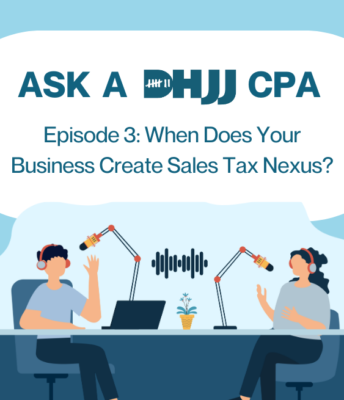Solid accounting is the foundation of the financial success of businesses in any industry and of any size. Good accounting practices build a reliable record of transactions for a business, keeping them up to date on what they have on hand, what they owe, and what they are owed. These records help owners, managers, and investors understand the performance of the organization, as well as its strengths and its weaknesses. When managed well, an accounting department, no matter how small, plays a key role in corporate strategy and the facilitation of decision-making throughout the company. Business decisions very frequently rise and fall on an accountant’s suggestion.
Oftentimes, small businesses face the same challenges and trials as the largest corporations. How these businesses handle what comes their way with the resources they have is what makes or breaks them. The hard truth is that smaller businesses usually have fewer resources, and they must be tight with what they have—which is why impeccable accounting is critical.
From sole proprietorships to public companies, and every firm in between, there are a few key lessons to pay attention to and mistakes to avoid whenever possible. It’s true what they say: the best offense is a good defense. Nipping these commonly faced business accounting issues in the bud before they grow into larger dilemmas will pay dividends in the future. Read on for more from the business accounting experts at DHJJ.
Not Having a Monthly Financial Report
Most businesses are producing financial reports, but how often are you going through your statements? If the answer is once a year, or even once a quarter, there is room to improve. Monthly financial reports provide the details to a business’s current financial situation allowing for the best decisions. Analyzing your accounting monthly will show you any emerging issues (like cash flow problems or lagging accounts payable) at an early stage, rather than at a time when it becomes difficult to handle them.
Businesses of any size benefit from frequent financial reports. As mentioned previously, the fewer the resources, the better grip your accountant or bookkeeper (or even you, for example, if you’re the owner) need to have on your numbers. A monthly report is critical if you’re looking for additional financing or to bring in new investors.
Mixing Personal and Business Accounts
Mixing personal and business accounts may seem harmless at first, but the practice is a very slippery slope. If a company is “pass-through,” meaning a sole proprietorship, a partnership, a limited liability company, or an S-corp, it’s critical that all finances remain separate. This is a complete rule: no credit cards, bank accounts, or books can cross over. If a company makes the error of intermingling assets and funds, it becomes very tough to decipher which costs can be written off as business expenses and which assets and investments are making money for your business. The result can be higher taxes or mistakes that amount to fraud or lead to bankruptcy.
The number one issue that business owners run into when they intermix business and personal accounts is the loss of legitimate tax deductions that they should be able to take advantage of. If a business seeks to deduct items from their taxes, they must be able to prove to the IRS that these expenses are truly deductible. In other words, the business must prove that the expenses are not personal in nature. You can imagine that this is hard to do when a business has been commingling funds and assets.
This practice can, in the worst cases, cause an entity’s status as a business to be endangered in the eyes of the IRS. The IRS can examine the books of small businesses to determine if the business is real, or simply a personal hobby that brings in funds. If this happens, and a business’ status is lost, they will no longer be able to claim losses against income – a huge disadvantage in both the short and long term.
Not Investing in Accounting Equipment and Software
Are you still using your computer’s notepad, or even old school pen and paper to keep your accounting records? Businesses of all sizes and in every industry can benefit from the affordable and cutting-edge accounting software that is available today. Modern accounting software reduces mistakes and miscalculations, so you can feel confident in your numbers.
Accounting programs can help businesses with several aspects of their business even beyond their balance sheets, including sales tracking, payroll management, invoice production, and contract management. They can even give your clients the option to pay their bills online, hopefully leading to an uptick in your accounts receivable collection efforts. Another important benefit of accounting software is the security that these programs provide.
Many kinds of “ERP” or enterprise resource planning accounting systems have features built in that help organizations detect both human error and fraud. These programs can alert a predetermined user when material information, such as bank account details or client names and addresses are added, changed or deleted. You can even structure your software to require approval from a specific user (such as a CFO or owner) for certain functions to work.
Not Following New Accounting Standards
Most companies are familiar with standard GAAP (or “generally accepted accounting principle”) requirements. These principles help your organization “speak the same financial language” as the rest of the business world, especially companies in the financing industry. GAAP requirements ensure that a business’ financial statements, including income statements, balance sheets, and cash flow statements, are readable and standardized. Even if your business is already complying with GAAP principles, there may be other standards that it should adhere to, such as the following recent updates:
- The Lease Standard (Topic 842) – this standard requires lessee’s commitments and rights to be recognized on their balance sheets.
- Cloud Computing Costs (ASU 2018-15, Subtopic 350-40) – this standard may apply to certain nonpublic entities who use cloud computing solutions.
- Gifts in Kind (ASU 2020-07) – this standard applies to all entities who have received a “significant” nonfinancial gift-in-kind, and expands upon required disclosures.

How DHJJ Can Help
It’s tough for even the most stringent of business professionals to stay on top of ever-changing accounting processes, standards, and requirements. You don’t need to go at it alone. Meet DHJJ: a team of experienced CPAs ready to help you with your business’ accounting.
Small businesses have enough on their plates without worrying about the particulars of their taxes and financial statements. Our team takes the stress out of your company’s finances, so you can focus on doing what you do best. If you’re interested in learning more, contact us online.





